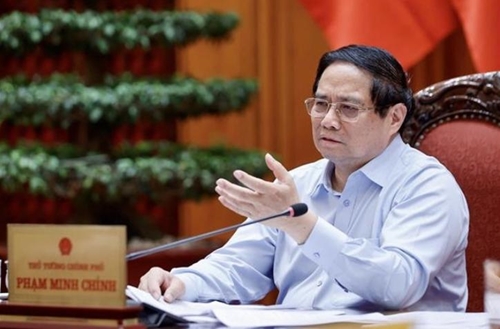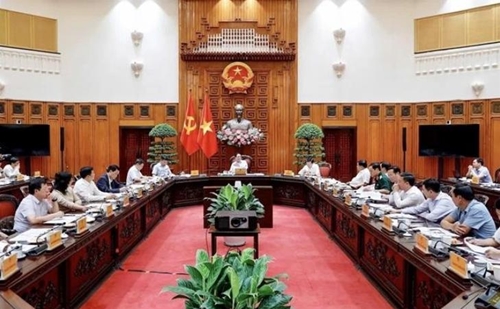The event between permanent Government members, ministries, and sectors discussed the drafting of a National Assembly (N.A.) resolution and a Government action plan for implementing Resolution 68-NQ/TW, dated May 4, 2025.
    |
 |
|
Prime Minister Pham Minh Chinh speaks at the event. |
The PM emphasized that the draft N.A. resolution must be submitted to the parliament during its ongoing ninth session to promptly address pressing issues. Given the limited time, high requirements, and the broad scope of content, he underlined the importance of adopting a suitable and feasible approach.
He noted that attention should be paid on the issues attracting the most interest from businesses and the public, particularly those that are urgent, essential, and could be handled immediately without big resources. He also requested efforts be invested in working out measures that act as “catalysts” — capable of creating significant impact and new momentum to promote business development and unlock production potential.
With the target of having 2 million businesses nationwide by 2030—double the current number—since only when businesses grow, can the nation develop, PM Pham Minh Chinh underscored that administrative procedures must be as fast, simple, and cost-effective as possible, especially in business registration, dispute resolution, and bankruptcy procedures.
He called for mechanisms to be devised to support business growth to create jobs and improve livelihoods. These include policies to help transform household businesses into enterprises, small businesses into medium-sized ones, and large businesses into even larger entities.
The PM stressed the need to concretize Resolution 68's provisions on fully guaranteeing the rights to property ownership, business freedom, and fair competition. He also urged the promotion of public-private partnerships in various forms such as public leadership – private governance, public investment – private management, and private investment – public use.
The Government leader also demanded further delegation of authority to ministries, sectors, localities, and investors in commissioning businesses to carry out infrastructure projects.
    |
 |
|
An overview of the meeting on May 7 |
This should be done basing on the principle of ensuring progress, quality, and cost control, and preventing corruption, wastefulness, and misconduct, he said. While advocating favorable mechanisms, he emphasized the importance of having tools to strengthen supervision and inspection.
To build public and business confidence in making investment and doing business, PM Pham Minh Chinh highlighted the need to institutionalize Resolution 68's provisions regarding the distinction between criminal liability and economic, administrative, or civil responsibility; and between corporate and individual accountability in the settlement of violations. He stressed that for civil and economic violations, priority should be given to civil, economic, or administrative remedies, allowing enterprises and entrepreneurs to proactively remedy wrongdoings and damage.
The PM asked for the swift collection of feedback from the business community and the finalization of the draft resolution within May, so that it can be submitted to the N.A. right during its ninth session. Meanwhile, the draft Government action plan must be built with strong determination, great efforts, and decisive and focus-driven action.
Resolution 68 targets that by 2030, the private economic sector will become the most important driving force of the national economy, with 2 million businesses, 20 businesses per 1,000 people, and at least 20 large companies engaging in global value chains.
By 2045, the sector will develop fast, strongly, and sustainably, proactively participate in global production and supply chains, and have high competitiveness in the region and the world. At that time, there will be at least 3 million businesses in the economy, contributing over 60% to the GDP.
Source: VNA